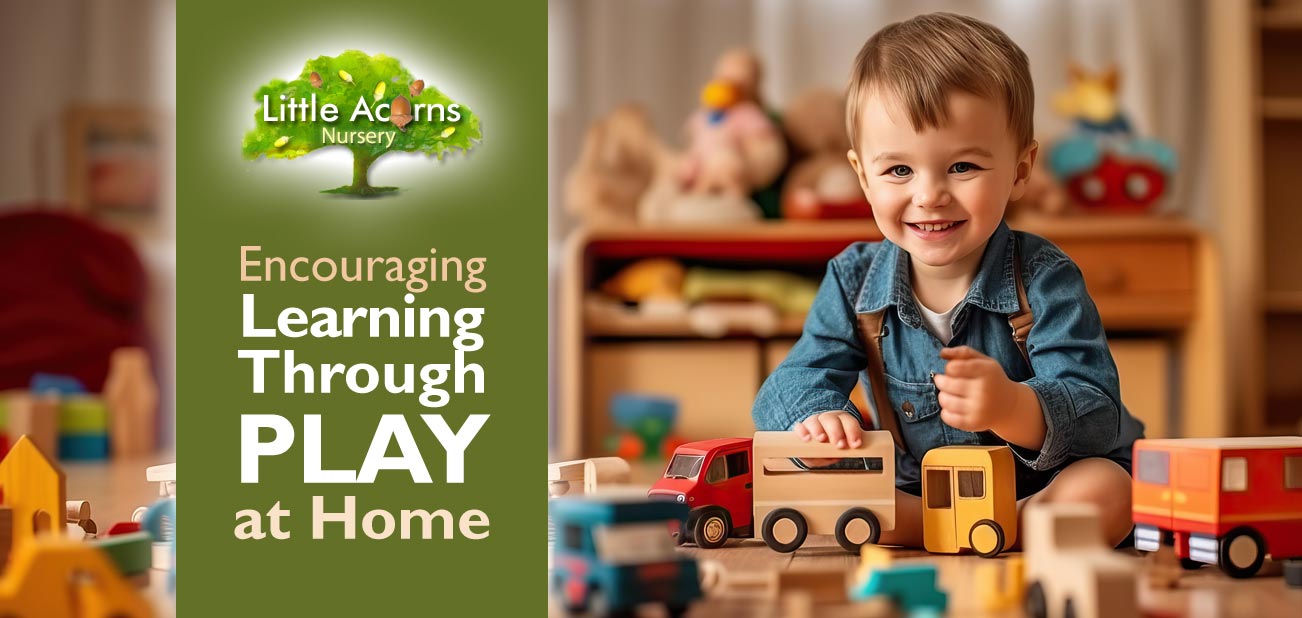
 As we discussed in our recent post The Power of Learning Through Play in Early Childhood, play helps babies and children to improve cognitive skills, social skills, motor skills and emotional growth. It feeds the imagination, boosts creativity and fosters a love of learning. Language skills benefit, problem-solving abilities are enhanced, and children naturally pick up maths concepts and even elements of science through play. With that in mind, today’s post follows up with the topic of Encouraging Learning Through Play at Home.
As we discussed in our recent post The Power of Learning Through Play in Early Childhood, play helps babies and children to improve cognitive skills, social skills, motor skills and emotional growth. It feeds the imagination, boosts creativity and fosters a love of learning. Language skills benefit, problem-solving abilities are enhanced, and children naturally pick up maths concepts and even elements of science through play. With that in mind, today’s post follows up with the topic of Encouraging Learning Through Play at Home.
How to Encourage Learning Through Play at Home
Play-based learning doesn’t stop when children leave childcare nurseries; it continues at home, where parents and caregivers play a crucial role in fostering an environment that supports exploration, curiosity, and growth through play. Through the suggestions outlined below, parents can help children more optimally benefit from everything that learning through play provides — while at home.
Create a Playful Space
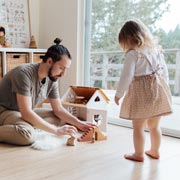 Designate an area in your home for play. It doesn’t need to be elaborate — even a corner with a few age-appropriate toys, books, and art supplies may be sufficient. Ensure, of course, that the space is safe and free from hazards before your child embarks on their play activities.
Designate an area in your home for play. It doesn’t need to be elaborate — even a corner with a few age-appropriate toys, books, and art supplies may be sufficient. Ensure, of course, that the space is safe and free from hazards before your child embarks on their play activities.
Be a Playful Partner
Getting involved in your child’s play is hugely beneficial to the quality and impact of children’s play. Play together, ask questions, foster feedback that’s two-way, and encourage imaginative storytelling during play sessions. Your active participation not only deepens the bonding experience but also profoundly enhances their learning.
Limit Screen Time
Screens are now a pervasive part of modern life, and they can be both a blessing and a challenge. TV, educational apps, interactive websites, and streaming services can provide valuable learning experiences, but too much screen time can have adverse effects on children’s development. At the very least, excessive screen time can potentially impede the development of essential social and motor skills. Therefore try to limit the time your child spends on screens, including TV, tablets, and smartphones. Instead, encourage physical, interactive, and imaginative ‘real life’ play — and your child will reap great rewards. It’s a fine balance between accommodating the digital age and ensuring children take part in real-world activities that support educational growth and development.
Embrace Outdoor Play
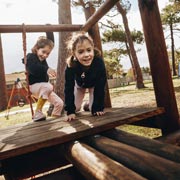 Outdoor play also offers a wealth of learning opportunities. It promotes physical health, stimulates the senses, and allows for unstructured exploration, which all contribute to holistic development. Take your child to the park, explore nature, or simply play with them in the back garden if you have one. Outdoor activities will also foster an appreciation for the natural world. Indeed, we wrote a whole post about the many benefits of outdoor play and another about the huge benefits of nature to children. Take a look at these important topics by following the bold links.
Outdoor play also offers a wealth of learning opportunities. It promotes physical health, stimulates the senses, and allows for unstructured exploration, which all contribute to holistic development. Take your child to the park, explore nature, or simply play with them in the back garden if you have one. Outdoor activities will also foster an appreciation for the natural world. Indeed, we wrote a whole post about the many benefits of outdoor play and another about the huge benefits of nature to children. Take a look at these important topics by following the bold links.
Encourage Pretend Play
Pretend play, such as role-playing with costumes or setting up a pretend kitchen or suchlike, fosters creativity and imagination — and is huge fun for your child. Encourage your child to take on different roles and scenarios during such playtime and watch their creativity and imagination soar!
Read and Explore Together
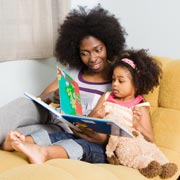 Reading is a wonderful way to support learning through play. Choose age-appropriate books, of course, and be sure to engage in interactive storytelling. Ask and encourage questions about the story, encourage your child to predict what might happen next, and ask them what they might do if it were them in the story. Books and reading teach children so many things and, like pretend play above, truly encourage their imaginations and get their creative juices flowing. Learn more about how you can supercharge your child’s education through reading here.
Reading is a wonderful way to support learning through play. Choose age-appropriate books, of course, and be sure to engage in interactive storytelling. Ask and encourage questions about the story, encourage your child to predict what might happen next, and ask them what they might do if it were them in the story. Books and reading teach children so many things and, like pretend play above, truly encourage their imaginations and get their creative juices flowing. Learn more about how you can supercharge your child’s education through reading here.
Let Them Lead
Children learn at their own pace, so be patient and, on the whole, allow them to take the lead during play. Avoid over-structuring playtime; instead, let it flow naturally, following your child’s interests and cues. Doing so will ensure they remain engaged in the activity. Do, of course, sometimes inject new, perhaps creative ideas into their play, though. As adults, we can steer children subtly in their play when there’s an idea or concept that they may not be familiar with and may otherwise have missed out on. Simple examples could include introducing the concept of using different voices for different characters in a role-playing game and showing them a different way to build a structure in a building block or construction-based game.
Celebrate Achievements
Be sure to acknowledge and celebrate your child’s achievements during play. Whether it’s completing a challenging task, creating a masterpiece, or achieving something new, positive reinforcement will make play more fulfilling and boost children’s self-esteem. It’ll also, of course, make the activity more joyful and fun for the child — and that’s a sure-fire way to motivate them to play and learn even more.
Encourage Social Play
 Arrange play dates with other children or involve siblings in play activities at home. Social play helps children learn essential social skills like cooperation, sharing, and conflict resolution. It’s also a great way to make new friendships, learn from each other, and become a closer member of friendship circles.
Arrange play dates with other children or involve siblings in play activities at home. Social play helps children learn essential social skills like cooperation, sharing, and conflict resolution. It’s also a great way to make new friendships, learn from each other, and become a closer member of friendship circles.
Age-Appropriate Toys
When playing involves toys and props, ensure your child has access to those that encourage open-ended play and creativity. Blocks, arts and crafts materials, and imaginative play sets like dolls or action figures are excellent examples as they allow children to lead the direction that their play session follows. With such toys, their imaginations can run riot and they can get truly creative. Rotate the choice of toys and introduce new ones to keep playtime fresh and engaging over time.
An Outstanding Childcare Nursery in Clayton-le-Woods, Chorley


Just like at Little Acorns Nursery, your home can be a vibrant hub for play-based learning. A nurturing environment, the right resources and materials, and actively engaging with children during play, will empower them to explore, learn, and grow. By embracing the power of play at home and in settings like Little Acorns, we are paving the way to a brighter future where young minds flourish, curiosity thrives, and discovery is both fun and educational.
Little Acorns is an outstanding nursery in Clayton-le-Woods, near Chorley. Indeed, we are officially an Outstanding Provider according to Ofsted and that’s backed up by our prestigious national nursery award. We also support Government-funded childcare schemes for eligible families, making childcare more affordable for Central Lancashire families. If you want the very best for your baby, toddler or preschooler, register them for a place or bring them on a guided tour and we’ll be delighted to show you around and answer any questions. Get in touch:
Little Acorns Nursery is ideally suited for families seeking an outstanding childcare service in Clayton-le-Woods, Chorley. It may also suit those living nearby in Clayton Brook, Clayton Green, Thorpe Green, Pippin Street, Buckshaw Village, Whittle-le-Woods, Farington, Bamber Bridge, Lostock Hall, Euxton, Leyland or Penwortham.

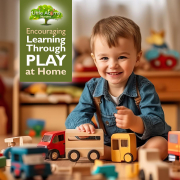
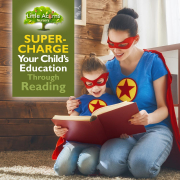
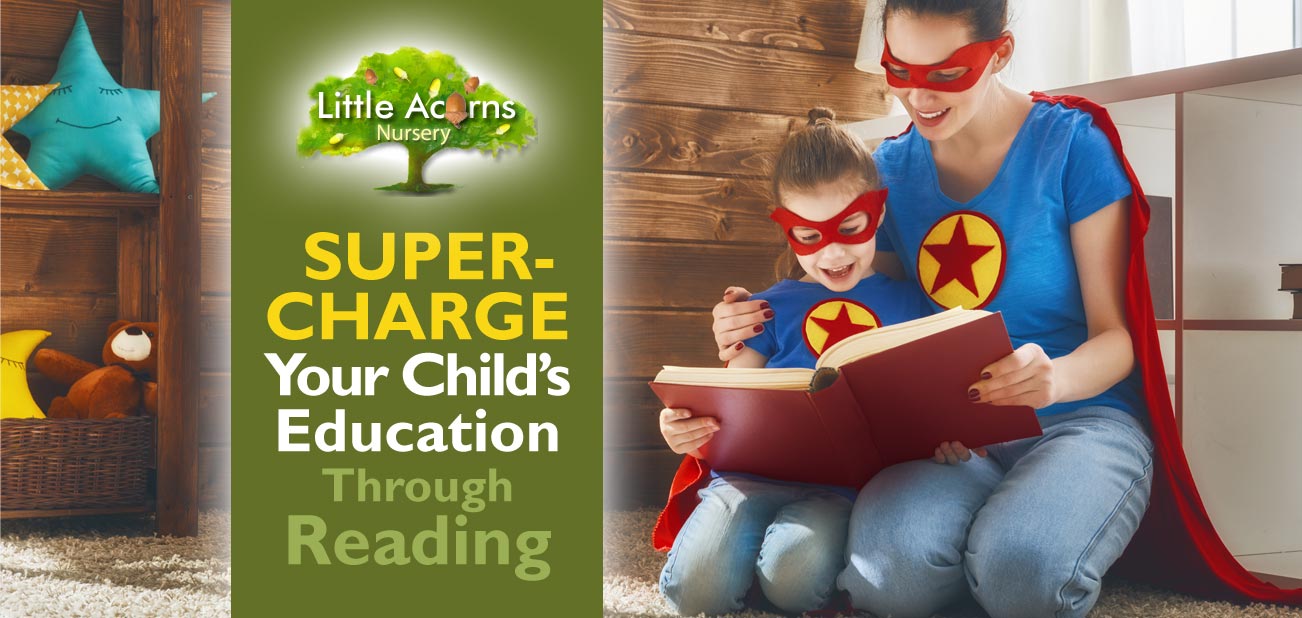
 Last year, we wrote a detailed post outlining
Last year, we wrote a detailed post outlining 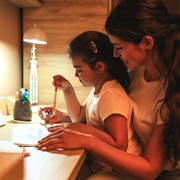 Interestingly, under-five children who came from disadvantaged backgrounds were shown to benefit even more than those who didn’t. For this reason, reading with parents/carers has been proposed as a possible way to close the performance deficit often seen with children from such backgrounds. It may well represent a perfect solution to even up the playing field.
Interestingly, under-five children who came from disadvantaged backgrounds were shown to benefit even more than those who didn’t. For this reason, reading with parents/carers has been proposed as a possible way to close the performance deficit often seen with children from such backgrounds. It may well represent a perfect solution to even up the playing field. Deeper bonds with parents/carers (after all, this is quality time spent together, one-to-one);
Deeper bonds with parents/carers (after all, this is quality time spent together, one-to-one);